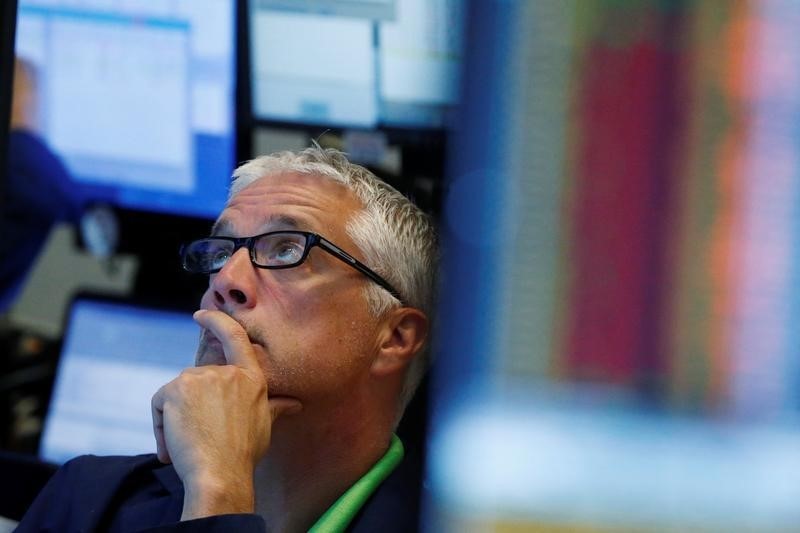By Nigel Stephenson
LONDON (Reuters) - European bank shares and sterling were on track for their biggest two-day slides on record on Monday as the fallout of Britain's shock vote to quit the European Union sowed turmoil in global financial markets for a second day.
U.S. index futures were down 0.7 percent (ESc1) (1YMc1), indicating Wall Street would follow European markets down.
Investors sought safe havens such as the yen, gold and low-risk government debt. Moves were not as extreme as on Friday when stocks fell by their most in almost five years but the combined falls on Friday and Monday broke records in some assets.
British finance minister George Osborne sought to reassure markets, saying the world's fifth-largest economy was strong enough to cope with the Brexit-inspired volatility, but the positive impact on sterling was only fleeting.
"This Brexit decision has taken the markets by total surprise. I would remain on the sidelines - no reason to step in yet," said Hampstead Capital hedge fund manager Lex Van Dam.
Markets bet on a further cut in Bank of England interest rates, almost fully pricing in a 25 basis point cut by the end of the year in another blow to sterling and to banks already facing reduced earnings as a result of Britain leaving the EU.
An index of European bank shares (SX7P) fell 7.5 percent, taking the decline in the last two trading days to around 20 percent, equating to a loss of 168 billion euros in market capitalization. Royal Bank of Scotland shares (L:RBS) fell 23 percent while Barclays (L:BARC) shed 18 percent.
Italian banks also suffered. UniCredit (MI:CRDI) fell 7.7 percent. The government was looking at options to help its banks and prevent further share price falls.
The pan-European FTSEurofirst 300 stocks index (FTEU3), which fell 7 percent on Friday in its biggest plunge in nearly eight years, lost a further 2.9 percent on Monday, for its biggest two-day fall since the aftermath of the Lehman collapse in 2008.
Britain's FTSE 100 index (FTSE) ebbed a further 2.1 percent on Monday and Germany's DAX (GDAXI) lost 2.2 percent.
Spain's IBEX index (IBEX) initially rose after acting prime minister Mariano Rajoy's People's Party fared better than expected in weekend elections but the gains melted away and the index was last down 1.4 percent.
(For Reuters new Live Markets blog on European and UK stock markets see reuters://realtime/verb=Open/url=http://emea1.apps.cp.extranet.thomsonreuters.biz/cms/?pageId=livemarkets)
World stocks measured by MSCI (MIWD00000PUS) hit their lowest level since March, down 0.9 percent. The index's fall since the Brexit vote was its biggest since last August when sharp falls in Chinese shares slammed work markets.
Sterling fell nearly 4 percent to $1.3152, surpassing its Friday low as yields on 10-year British government debt fell below 1 percent for the first time
It fell 2.5 percent to 83.33 pence against the euro (EURGBP=) and 3.9 percent to about 134 yen (GBPJPY=).
"Uncertainty equals currency weakness, we know this, and there is no sense that this (sterling) is a value trade right now and that you have to get back in. It is too early for anyone to start calling a bottom," said Neil Mellor, a currency strategist at Bank of New York Mellon (NYSE:BK) in London.
The euro
Government officials stepped up warnings that they could intervene in currency market to stabilize the yen, whose strength harms exporters.
This helped Japan's Nikkei 225 (N225) share index, which closed 2.4 percent higher. MSCI's broadest index of Asia-Pacific shares outside Japan (MIAPJ0000PUS) fell 0.4 percent. Companies with UK exposure in particular came under pressure.
Yields on core government debt fell again. German 10-year bond yields
OUTPERFORM
Spanish 10-year bonds
U.S. Treasury yields also fell. The 10-year note (US10YT=RR) fell more than 10 bps to as low as 1.46 percent, still above Friday's low of 1.41 percent.
Gold

Brent crude oil (LCOc1) was higher in Asian trade on a view that Brexit would have minimal impact on global oil demand. But, by midday in London, it was down 18 cents at $48.23 a barrel.
(Aditional reporting by Hideyuki Sano in Tokyo, Nichola Saminather in Singapore, Patrick Graham, Alistair Smout and Dhara Ranasinghe in London; Editing by Toby Chopra)